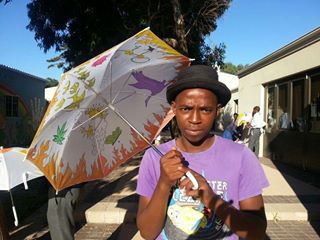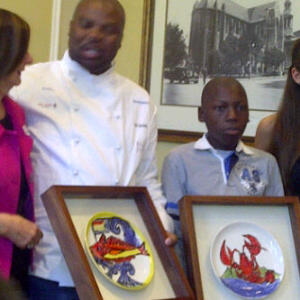In lieu of National Child Protection week, I needed to post about this brilliant and inspiring project I learnt of just last week, when Masterchef South Africa judge Benny Masekwameng was handed a beautiful hand painted ceramic dish, created by Lalela Project’s 14 year old Sakhi Sifuba.
I could just tell that tremendous pride, love, time and effort went into producing such beautiful work which lies in stark contrast to where many of these kids reside from. Hope in the form of art, instilled into young lives who rarely come across people who believe in them.
Hats off to the Andrea, Oliver and all the other folks from Lalela Project for the phenomenal work they are putting in as well as inspiring within these amazing kids.
Respect.
Cannot wait for my visit!
More on the project:
The Lalela Project believe Imagination, Activation, Collaboration, and Transformation (I ACT) is made possible through Ideas, Art, and Music (I AM). Through their global art exchange projects, Lalela Project seeks to inspire teachable moments for children affected by extreme poverty and to invite transformation for all who choose to join their efforts.
Background:
Art is a powerful universal language that allows us to break through cultural and communication barriers, and open our hearts and minds to the hopes and challenges that connect us all. This very notion is the seed of Lalela Project’s movement – exchanging ideas, art, and music as a way to listen to one another, and understand how to make OUR world better, together.
As global citizens, one of our most challenging, complex problems is extreme poverty – most especially its devastating effects on children. Extreme poverty deprives children of essential goods or services they need to survive, grow, and develop – food, shelter, water, education, and/or health care.¹ These deprivations greatly affect children’s mental, physical, emotional, and spiritual development – preventing them from reaching their full potential and ultimately perpetuating an endless cycle of poverty.
Most prominent in Sub-Saharan Africa and Southeast Asia, extreme poverty and its contributing factors and consequences can be fatal to children and their families. Their livelihoods are often threatened by diseases such as malaria, HIV/AIDS, and TB, armed conflict, and displacement. Further, extreme poverty entrenches social, economic, and gender disparities, and undermines protective family environments. In sum, extreme poverty makes it impossible for children to thrive.
Andrea Kerzner was motivated by the many organizations that work tirelessly to address the physical needs of children affected by extreme poverty, and decided to join them in an innovative way. She was inspired to complement their efforts with programs that focus on the mental, emotional, and spiritual health of children. Through collaboration, she believed, we can reach the “whole” child, both his/her physical AND mental self. By empowering a child to see possibilities in his or her future, we can break the cycle of extreme poverty, one child at a time.
Understanding the power of the arts to connect with children on an emotional, mental, and spiritual level, Andrea founded Lalela Project. The word “lalela”, which in Zulu means “to listen”, is at the heart of what Lalela Project does. By listening to children’s individual stories, and understanding the communities’ needs in which we work, Lalela Project works to create possibilities and positive change through the global exchange of ideas, art, and music.
Upcoming project:
Phulaphula Mobile Arts Unit:
Community-Based Weekend and After-School Programs.
Lalela Project continues the arts education program launched in June and July 2010, by deploying a mobile art studio– the Phulaphula Bus– coming soon. The Bus will travel to community organizations where children affected by poverty are especially vulnerable to violence, health complications, and drugs. Like the SANG World Cup workshops, the Lalela Project Phulaphula Bus Workshops will employ the universal languages of art and music to identify and manage the challenges children face in day-to-day life. The Bus will also provide a safe environment for creative exploration with the hope of inspiring deeper learning and the opportunity to envision a different future.
The Phulaphula Bus will be designed and customized with the help of Brigadier ML Wahab, Creator of the Mobile Community Outreach Units for the South African Police Services. Brigadier Wahab, Support Services for the National Evaluation Service, Head Office, Pretoria, brings to Lalela Project a wealth of experiences in this area by donating his services to help design the most cost-effective Bus. Additionally, we will work with local artists, interns from local art schools and technikons, and children to design and paint the Bus, ensuring that the community truly feels a sense of ownership and pride for their Bus.
The Bus will serve communities five afternoons a week, during after-school hours, and Saturdays. With information provided from SA Police Services and government departments, Lalela Project will deploy the Bus to communities in greatest need of its services.
for more information on how to get involved visit their site:
mj








Article Reblogged by SA BLOGGERS – http://www.southweb.org/coza/